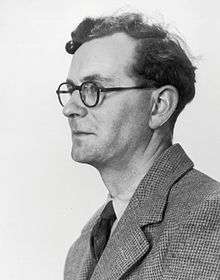Rodney Robert Porter
| Rodney Porter | |
|---|---|
 | |
| Born |
Rodney Robert Porter 8 October 1917 Newton-le-Willows, Lancashire |
| Died | 6 September 1985 (aged 67) |
| Nationality | English |
| Fields | biochemistry |
| Institutions | |
| Alma mater |
|
| Thesis | The free amino groups of proteins (1948) |
| Doctoral advisor | Frederick Sanger[1] |
| Known for | Chemical structure of antibodies |
| Notable awards |
|
Rodney Robert Porter, CH, FRS[2] (8 October 1917 – 6 September 1985) was an English biochemist[3][4] and Nobel laureate.[5][6][7][8][9][10][11][12]
Education and early life
Born in Newton-le-Willows, St Helens, Lancashire, England, Rodney Robert Porter received his Bachelor of Science degree from the University of Liverpool in 1939 for Biochemistry. He moved to the University of Cambridge where he became Fred Sanger's first PhD student.[1] He was awarded his doctorate in 1948.[13][14]
Career and research
Porter worked for the National Institute for Medical Research for eleven years (1949–1960) before joining St. Mary's Hospital Medical School, Imperial College London and becoming the Pfizer Professor of Immunology. In 1967 he was appointed Whitley Professor of Biochemistry at the University of Oxford, and Fellow of Trinity College, Oxford. His colleague Elizabeth Press (Betty Press) worked with him at NIMR, St Mary's and at Oxford contributing extensively to the work which led to the Nobel Prize.
Awards and honours
Porter was elected a Fellow of the Royal Society (FRS) in 1964.[2] He won the Gairdner Foundation International Award in 1966. In 1972, Porter shared the Nobel Prize for Medicine or Physiology with Gerald M. Edelman for determining the chemical structure of an antibody.[15][16][17][18][19] Using the enzyme papain, he broke the blood's immunoglobin into fragments, making them easier to study. He also looked into how the blood's immunoglobins react with cellular surfaces. He subsequently worked with colleagues Kenneth BM Reid, Robert Sim and Duncan Campbell on developing understanding of the Complement Proteins associated with defence against infection.
In 1991, Raymond Dwek founded the Oxford Glycobiology Institute at the Department of Biochemistry, University of Oxford and this building was named after Porter as the Rodney Porter building.
Death
Porter died in a road accident near Winchester, Hampshire and is survived by his wife and five children.
References
- 1 2 "Rodney Porter Memorial Lectures". Oxford: University of Oxford. Archived from the original on 2015-01-04.
- 1 2 3 Perry, S. V. (1987). "Rodney Robert Porter. 8 October 1917-6 September 1985". Biographical Memoirs of Fellows of the Royal Society 33: 444–426. doi:10.1098/rsbm.1987.0017. JSTOR 769960. PMID 11621436.
- ↑ Johnstone, A. P.; Kerr, M. A.; Turner, M. W. (1985). "Rodney Robert Porter (1917–1985)". Journal of Immunological Methods 85 (1): 1–4. doi:10.1016/0022-1759(85)90268-6. PMID 3908556.
- ↑ Steiner, L. A. (1985). "Rodney Robert Porter (1917–1985)". Nature 317 (6036): 383. doi:10.1038/317383a0. PMID 3900741.
- ↑ Raju, T. N. (1999). "The Nobel chronicles. 1972: Gerald M Edelman (b 1929) and Rodney R Porter (1917-85)". Lancet 354 (9183): 1040. doi:10.1016/S0140-6736(05)76658-7. PMID 10501404.
- ↑ Porter, R. R. (1991). "Lecture for the Nobel Prize for physiology or medicine 1972: Structural studies of immunoglobulins. 1972". Scandinavian journal of immunology 34 (4): 381–389. PMID 1925407.
- ↑ Hein, H. (1973). "Nobel price for medicine 1972". Fortschritte der Medizin 91 (4): 167. PMID 4573771.
- ↑ Datta, R. K.; Datta, B. (1973). "Nobel Prize winners in Medicine (1972)". Journal of the Indian Medical Association 60 (1): 17–18. PMID 4577220.
- ↑ Schlesinger, M. (1973). "The 1972 Nobel prize for medicine, G.M. Adelman and R.R. Porter". Harefuah 84 (1): 41. PMID 4571222.
- ↑ Harboe, M. (1972). "Nobel prize for immunoglobulin research". Tidsskrift for den Norske laegeforening : tidsskrift for praktisk medicin, ny raekke 92 (34): 2363–2365. PMID 4568120.
- ↑ Peterson, P. A. (1972). "1972 Nobel prize in physiology or medicine. The chemical structure of antibodies". Lakartidningen 69 (44): 5069–5073. PMID 4561953.
- ↑ Chedd, G. (1973). "Nobel prize for medicine in 1972". Orvosi hetilap 114 (8): 451–452. PMID 4568717.
- ↑ Britannica Information on Rodney Porter
- ↑ Nobel Prize Biography of Rodney Porter
- ↑ Kyle, R A; Shampo M A (November 2000). "R.R. Porter—the 4-chain structure of immunoglobulin G". Mayo Clin. Proc. 75 (11): 1110. doi:10.4065/75.11.1110. PMID 11075737.
- ↑ "Proceedings of the International Symposium on "The role and significance of international cooperation in the biomedical sciences." Dedicated to the memory of Dr. Rodney R. Porter. Washington, D.C., September 21–23, 1983". Perspect. Biol. Med. 29 (3 Pt 2): S1–229. 1986. PMID 3523420.
- ↑ Small, P A (1985). "Rod Porter: his gifts to a young scientist". Biosci. Rep. 5 (10–11): 969–71. doi:10.1007/BF01119909. PMID 3913473.
- ↑ Pasternak, C A (1985). "Rodney Robert Porter". Biosci. Rep. 5 (10–11): 809–13. doi:10.1007/BF01119892. PMID 3913470.
- ↑ Pasternak, Charles A. (1985). "Special issue in memory of Rodney Porter". Biosci. Rep. 5 (10–11): 809–1014. PMID 3913469.
| ||||||||||
|